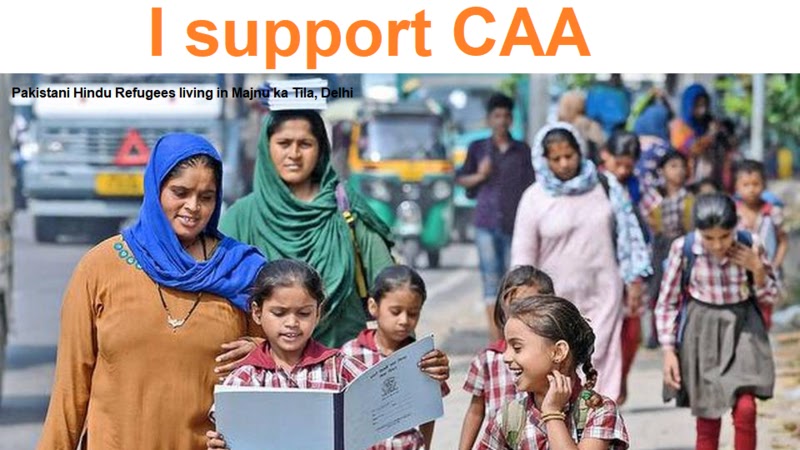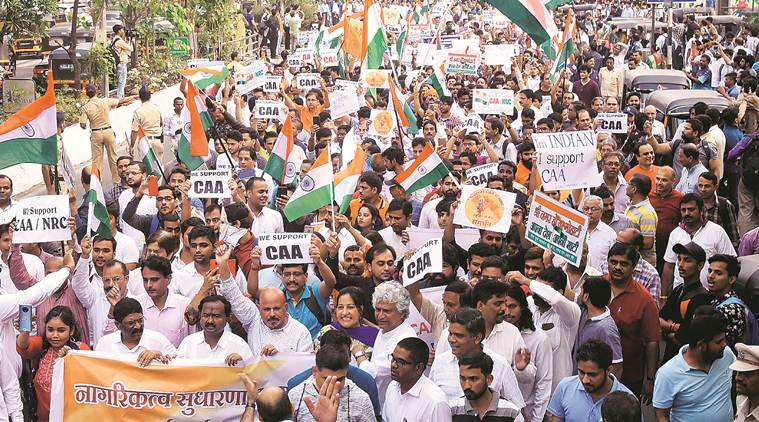#The CAA will come as a big boon to all those people who have been the victims of Partition and the subsequent conversion of the three countries into theocratic Islamic republics.
========================================================================
--------------------------------------------------------------------------------------------------------------------------
The opposing parties like Congress, SP, and many others and appeasement policy by shrewd politicians like Mamta Banerjee are responsible for misleading the people in the name of NCC and NRC in India. Scholars are asserting that the present CAA is against the fundamental spirit of the constitution. Besides, this will destroy the very fabric of secularism in India. This article will try to answer the scuttlebutt around the bill. The article will also deal with the original spirit of this bill and further check the constitutionality of Bill.
Citizenship in India is defined by the Citizenship Act 1955, which is mentioned in Part two of the Indian Constitution (Article 5 to 11). This act says that any person can acquire India citizenship by following five methods – by birth in India, by descent, through registration, by naturalization and by incorporation of the territory into India. In the bill, it was also mentioned that illegal migrants could stay in India until the government decides the future course of action and if the Illegal migrants have no valid documents then they may be put in jail or deported under the Foreigners Act, 1946 and the Passport (Entry into India) Act, 1920. The Citizenship (Amendment) Acts have been amended in 1986, 1992, 2003, 2005, 2015 and 2019 by the Parliament of India.
In 2015, the government of India exempted the religious minority communities of Afghanistan, Bangladesh, and Pakistan from the Foreigners Act 1946 and Passport Act 1920. These communities were Hindus, Sikhs, Buddhists, Jains, Parsis, and Christians from Afghanistan, Bangladesh, and Pakistan. Again, the government introduced the bill in 2106 but the bill could not pass in Rajya Sabha. Subsequently, the Citizenship (Amendment) Bill, 2019 was passed in Parliament in December 2019.

Inner Line Permit (ILP): This line is a special permit that citizens from other parts of India require to enter a state-protected by the ILP regime. Without an ILP granted by the state government, an Indian from another state cannot visit a state that is under the ILP regime. Sixth Schedule: The Sixth Schedule relates to special provisions in the administration of certain Northeastern states (Assam, Mizoram, Meghalaya, and Tripura). It provides special powers for Autonomous District Councils (ADCs) in these states.

#First citizenship as a concept is a privilege in itself. Everywhere in the world, Some Fundamental rights available to citizens of any country and some to the foreigner. For any country development, the exact figure and number of its citizens are necessary. Indian constitution has given reasonable criteria to govt to make a criterion for its citizens. Who can be India citizens? Therefore, the act is not constitutionally wrong because reasonable classifications/ provisions are already mentioned in the constitution. Article 15, 16 19, 29, 30 of Indian Constitution are only available to Citizens of India not to foreigners So citizenship is the sole domain of government to decide who can be citizens and what can be their criterion?
##Second, being a secular country India has some responsibilities. India is a neighbor to three countries whose state religion is Islam. The constitutions of these countries provide special provisions for Muslims citizens As a result, many persons belonging to Hindu, Sikh, Buddhist, Jain, Parsi, and Christian communities have faced persecution on grounds of religion in these countries. They are facing religious persecution and fundamentalists of these countries target the minorities. Their population is decreasing day by day, for example, the population of minorities in 1951 in Pakistan and Bangladesh was 28 and 32 % respectively but now it has shrunk to 4 %and 8 % respectively. Hence, the CAA is one of the classical examples of positive discrimination in India mentioned in the article (15, 16) of the Indian Constitution.
This Bill will come as a big boon to all those people who have been the victims of Partition and the subsequent conversion of the three countries into theocratic Islamic republics. And from time memorial India is a proper place for those helpless people, who were persecuted. because in all three countries mentioned in CAA, have made their state religion as Islam.
###Third, the protest in the name of CAA and NRC is bogus and spurious. The protests are anticipatory. We should remember NRC and CAA are different things. People are living in delusion. It is the responsibility of government and society those people who are responsible behind the spreading misinformation about CAA in India should be identified and punish for their offenses with due process of law.
(Authors are researchers at Centre for Comparative Politics and Political Theory, School of International Studies at JNU)
-------------------------------------------------------------------------------------------------------------------------
JAY HIND
JAY BHARATHAM
VANDHE MATHARAM
BHARAT MATHA KI JAY.
=======================================================================
--------------------------------------------------------------------------------------------------------------------------
#OPINION : 26/02/2020 : 2070.
#BREAKING MISCONCEPTION OF CITIZENSHIP AMENDMENT ACT (CAA) : 30-Dec-2019 : - Pravesh Kumar & Nikhil Kumar : Organiser : Media report.
#The CAA will come as a big boon to all those people who have been the victims of Partition and the subsequent conversion of the three countries into theocratic Islamic republics.
-----------------------------------------------------------------------------------------------------------------------*1. Introduction :
Recently the parliament of India has passed the Citizenship Amendment Act (2019). The bill is the Classical example of the rich heritage of Vasudhaiva Kutumbakam and Positive intervention in Indian Context. From the introduction of this bill in Lok Sabha, there is misinformation around the Act in India. The so-called intellectual groups are behind the disinformation around CAA in India. The victims of their fault are students community who are studying in various universities and colleges in India.The opposing parties like Congress, SP, and many others and appeasement policy by shrewd politicians like Mamta Banerjee are responsible for misleading the people in the name of NCC and NRC in India. Scholars are asserting that the present CAA is against the fundamental spirit of the constitution. Besides, this will destroy the very fabric of secularism in India. This article will try to answer the scuttlebutt around the bill. The article will also deal with the original spirit of this bill and further check the constitutionality of Bill.
Citizenship in India is defined by the Citizenship Act 1955, which is mentioned in Part two of the Indian Constitution (Article 5 to 11). This act says that any person can acquire India citizenship by following five methods – by birth in India, by descent, through registration, by naturalization and by incorporation of the territory into India. In the bill, it was also mentioned that illegal migrants could stay in India until the government decides the future course of action and if the Illegal migrants have no valid documents then they may be put in jail or deported under the Foreigners Act, 1946 and the Passport (Entry into India) Act, 1920. The Citizenship (Amendment) Acts have been amended in 1986, 1992, 2003, 2005, 2015 and 2019 by the Parliament of India.
In 2015, the government of India exempted the religious minority communities of Afghanistan, Bangladesh, and Pakistan from the Foreigners Act 1946 and Passport Act 1920. These communities were Hindus, Sikhs, Buddhists, Jains, Parsis, and Christians from Afghanistan, Bangladesh, and Pakistan. Again, the government introduced the bill in 2106 but the bill could not pass in Rajya Sabha. Subsequently, the Citizenship (Amendment) Bill, 2019 was passed in Parliament in December 2019.

*2. What the Bill says :
The Bill amends the Citizenship Act, 1955 and gives the citizenship rights to religious persecuted minorities of Afghanistan, Bangladesh, and Pakistan, who entered India on or before December 31, 2014. These communities included Hindu, Sikh, Buddhist, Jain, Parsi, and Christian. The Bill reduced the duration of citizenship by naturalization from 11 years to 5 years. However, there are some exceptions to this act. Some provisions of this act will not apply to two categories - states protected by the ‘Inner Line’, and areas covered under the Sixth Schedule of the Constitution.Inner Line Permit (ILP): This line is a special permit that citizens from other parts of India require to enter a state-protected by the ILP regime. Without an ILP granted by the state government, an Indian from another state cannot visit a state that is under the ILP regime. Sixth Schedule: The Sixth Schedule relates to special provisions in the administration of certain Northeastern states (Assam, Mizoram, Meghalaya, and Tripura). It provides special powers for Autonomous District Councils (ADCs) in these states.
*3. Discourse on CAA :
Citizenship is the status of a person recognized under law as being a legal member of a sovereign state or belonging to a nation. In India, Articles 5 – 11 of the Constitution deals with the concept of citizenship. The term citizenship entails the enjoyment of full membership of any State in which a citizen has civil and political rights.
#First citizenship as a concept is a privilege in itself. Everywhere in the world, Some Fundamental rights available to citizens of any country and some to the foreigner. For any country development, the exact figure and number of its citizens are necessary. Indian constitution has given reasonable criteria to govt to make a criterion for its citizens. Who can be India citizens? Therefore, the act is not constitutionally wrong because reasonable classifications/ provisions are already mentioned in the constitution. Article 15, 16 19, 29, 30 of Indian Constitution are only available to Citizens of India not to foreigners So citizenship is the sole domain of government to decide who can be citizens and what can be their criterion?
##Second, being a secular country India has some responsibilities. India is a neighbor to three countries whose state religion is Islam. The constitutions of these countries provide special provisions for Muslims citizens As a result, many persons belonging to Hindu, Sikh, Buddhist, Jain, Parsi, and Christian communities have faced persecution on grounds of religion in these countries. They are facing religious persecution and fundamentalists of these countries target the minorities. Their population is decreasing day by day, for example, the population of minorities in 1951 in Pakistan and Bangladesh was 28 and 32 % respectively but now it has shrunk to 4 %and 8 % respectively. Hence, the CAA is one of the classical examples of positive discrimination in India mentioned in the article (15, 16) of the Indian Constitution.
This Bill will come as a big boon to all those people who have been the victims of Partition and the subsequent conversion of the three countries into theocratic Islamic republics. And from time memorial India is a proper place for those helpless people, who were persecuted. because in all three countries mentioned in CAA, have made their state religion as Islam.
###Third, the protest in the name of CAA and NRC is bogus and spurious. The protests are anticipatory. We should remember NRC and CAA are different things. People are living in delusion. It is the responsibility of government and society those people who are responsible behind the spreading misinformation about CAA in India should be identified and punish for their offenses with due process of law.
(Authors are researchers at Centre for Comparative Politics and Political Theory, School of International Studies at JNU)
-------------------------------------------------------------------------------------------------------------------------
JAY HIND
JAY BHARATHAM
VANDHE MATHARAM
BHARAT MATHA KI JAY.
=======================================================================

















Comments
Post a Comment